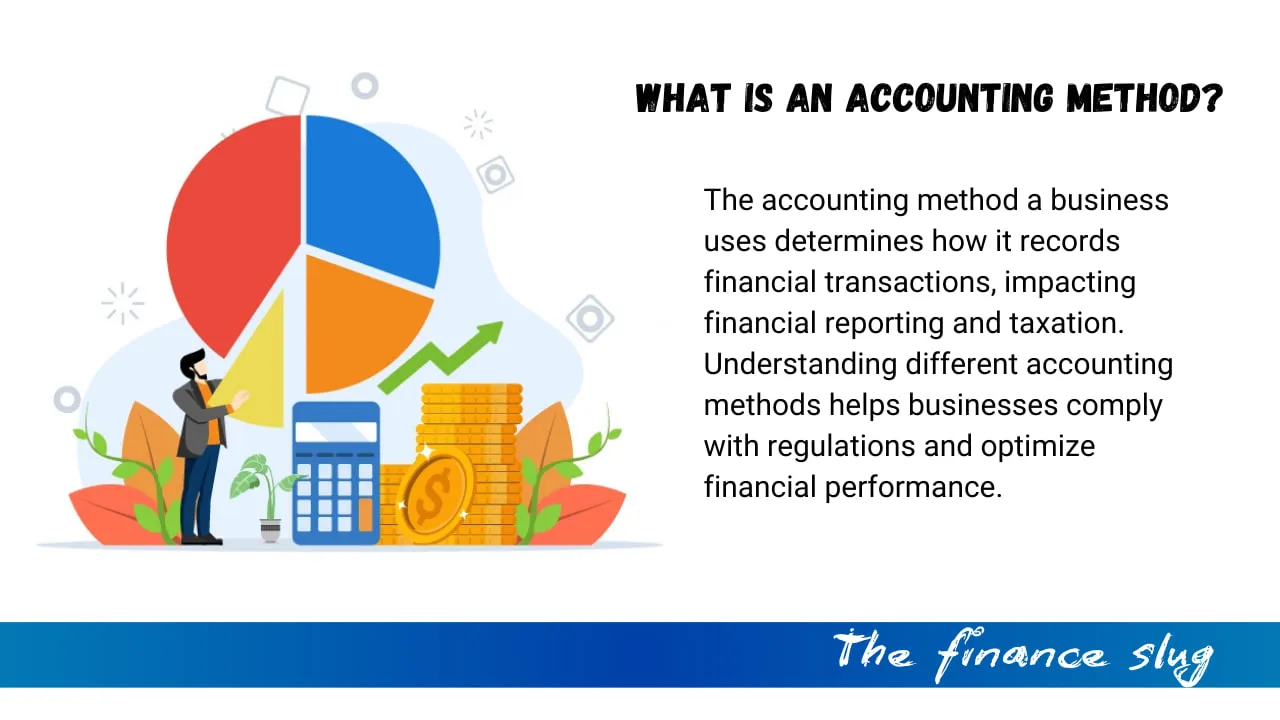
Introduction
The accounting method a business uses determines how it records financial transactions. It plays a crucial role in financial reporting, taxation, and business decision-making. Understanding different accounting methods helps businesses comply with regulations and optimize financial performance.
In this guide, we’ll explore:
- The definition of an accounting method
- Different types of accounting methods
- How accounting methods impact financial statements
- Choosing the right accounting method for your business
Let’s dive in!
What is an Accounting Method?
An accounting method refers to the set of rules a company follows to record its financial transactions and recognize revenue and expenses. It ensures consistency in financial reporting and helps businesses stay compliant with tax laws.
Accounting methods primarily fall into two categories:
- Cash Accounting – Recognizes revenue and expenses when cash is received or paid.
- Accrual Accounting – Recognizes revenue and expenses when they are earned or incurred, regardless of cash movement.
Different countries and industries may have specific guidelines on which method businesses should use, often influenced by regulatory bodies like the Generally Accepted Accounting Principles (GAAP) and the International Financial Reporting Standards (IFRS).
Types of Accounting Methods
1. Cash Accounting Method
The cash accounting method records transactions only when cash is exchanged. Revenue is recognized when cash is received, and expenses are recorded when payments are made.
Example of Cash Accounting:
- A company sells a product in December but receives payment in January. Under cash accounting, the revenue is recorded in January when the cash is received.
Advantages of Cash Accounting:
✔ Simple and easy to manage
✔ Suitable for small businesses and freelancers
✔ Provides a clear picture of actual cash flow
Disadvantages of Cash Accounting:
✘ Does not accurately reflect financial health for larger businesses
✘ Can lead to misleading financial reports
2. Accrual Accounting Method
The accrual accounting method records transactions when they occur, regardless of when the payment is made. Revenue is recognized when earned, and expenses are recorded when incurred.
Example of Accrual Accounting:
- A company provides services in December and invoices the client. Even if payment is received in January, the revenue is recorded in December.
Advantages of Accrual Accounting:
✔ Provides a more accurate picture of financial health
✔ Complies with GAAP and IFRS regulations
✔ Helps in long-term financial planning
Disadvantages of Accrual Accounting:
✘ More complex than cash accounting
✘ Can make cash flow harder to track
3. Hybrid Accounting Method
A hybrid accounting method combines elements of both cash and accrual accounting. Businesses using this method may record revenue using accrual accounting while tracking expenses with cash accounting.
Example of Hybrid Accounting:
- A company may use accrual accounting for sales revenue but record expenses only when they are paid.
When to Use Hybrid Accounting?
- Small businesses transitioning to accrual accounting
- Businesses wanting a mix of cash flow tracking and accurate reporting
Also Read : Accounting Information System (AIS): Definition, Components, and Benefits
Cash vs. Accrual Accounting: Key Differences
| Feature | Cash Accounting | Accrual Accounting |
|---|---|---|
| Revenue Recognition | When cash is received | When earned (even if unpaid) |
| Expense Recognition | When cash is paid | When incurred (even if unpaid) |
| Complexity | Simple | More complex |
| Accuracy | Less accurate for large businesses | More accurate financial picture |
| Tax Implications | Taxes paid when cash is received | Taxes based on earned revenue, even if unpaid |
How Accounting Methods Impact Financial Statements
Choosing an accounting method affects three primary financial statements:
- Income Statement – Revenue and expenses may differ depending on when transactions are recorded.
- Balance Sheet – Accounts receivable and accounts payable are only present in accrual accounting.
- Cash Flow Statement – Cash accounting reflects actual cash flow, while accrual accounting requires adjustments for non-cash transactions.
For businesses needing financing or investment, accrual accounting provides a clearer picture of financial health, making it a preferred choice for investors and lenders.
Choosing the Right Accounting Method for Your Business
1. Consider Your Business Size
- Small businesses & freelancers: Cash accounting is simpler and more manageable.
- Medium to large businesses: Accrual accounting is usually required for compliance and better reporting.
2. Tax Requirements
The IRS requires businesses earning over $25 million in gross receipts to use accrual accounting. Smaller businesses can choose either method based on tax benefits.
3. Industry Norms & Regulations
Certain industries (e.g., retail, healthcare, real estate) may have specific guidelines that favor one accounting method over another.
4. Financial Goals
If your business needs investors or plans to scale, accrual accounting provides a more comprehensive financial picture.
Switching Between Accounting Methods
A business can switch from cash to accrual accounting (or vice versa), but it requires approval from tax authorities like the IRS. The process involves:
- Filing Form 3115 (Application for Change in Accounting Method)
- Adjusting financial records to align with the new method
- Ensuring compliance with tax regulations
Switching can be beneficial if a business expands and needs better financial transparency.
Final Thoughts
Understanding accounting methods is essential for financial success. Whether choosing cash accounting for simplicity or accrual accounting for accuracy, businesses must align their accounting practices with their financial goals and regulatory requirements.
By selecting the right accounting method, businesses can ensure accurate financial reporting, tax compliance, and long-term stability.
Also Read : Accounting Equation Explained: Formula, Importance & Examples
Frequently Asked Questions (FAQs)
1. Can I use both cash and accrual accounting methods?
Yes, a business can use a hybrid method or switch from one method to another with proper approval from tax authorities.
2. Is accrual accounting better than cash accounting?
It depends on the business. Small businesses may prefer cash accounting for simplicity, while larger companies need accrual accounting for accuracy and compliance.
3. How does an accounting method affect taxes?
Cash accounting taxes are based on received income, while accrual accounting taxes are based on earned income, even if unpaid. This can impact tax liabilities.
4. Do all businesses have to follow GAAP accounting rules?
Publicly traded companies must follow GAAP, but private businesses may have flexibility depending on their size and industry.
5. How often can a business change its accounting method?
A business can change its accounting method but needs IRS approval and must comply with specific guidelines.
Stock Market Crash Today: A Bloodbath on Monday – What You Need to Know
Published on financeslug.xyz The global financial markets are reeling from a massive sell-off, and Indian…
Wall Street Bonuses Reach Record $47.5 Billion in 2024, Up 34% from Previous Year
How to Convert Delimited CSV Data into Columns in Excel
CSV (Comma-Separated Values) files are widely used for data exchange, but when opened in Excel,…
Harvard University Announces Free Tuition for Families Earning $200K or Less
Harvard’s New Tuition-Free Policy: What You Need to Know Harvard University has unveiled a groundbreaking…
Eli Lilly’s 1.8B Dollar Investment in Weight Loss Drugs
Ireland’s Weight-Loss Drug Boom: A Game-Changer for Economy and Healthcare Ireland is witnessing a surge…
Forever 21 Files for Bankruptcy Again: The End of an Era in Fast Fashion?
Forever 21, once a staple in American malls and a leader in the fast-fashion industry,…







